
 |
 |
| |
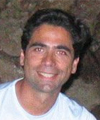 |
Nuno Bandeira is a Ph.D. student working with Pavel Pevzner in UCSD's department of Computer Science and Engineering and an active member of the UCSD Computational Mass Spectrometry research group. His main research interests are on algorithms, machine learning and their application to computational biology. The current focus of his research is on shotgun assembly of uninterpreted MS/MS spectra, i.e., how to reconstruct a protein sequence given only MS/MS spectra of some of its subsequences.
[Abstract] |
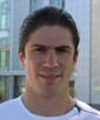 |
Serafim Batzoglou is an assistant professor in the Computer Science Department at Stanford University. He received his Ph.D. from MIT in June 2000, with a thesis on computational genomics. Professor Batzoglou is a recipient of a Sloan Research Fellowship and Career Award in Computer Science from the National Science Foundation. He earned the Best Paper Award at ISMB 2004. Serafim's research has focused on the development of algorithms and systems for genomics. Some of the topics he is working on include sequence alignment algorithms; hidden Markov models; whole-genome comparison; annotation of biological features in genomes; microarray analysis; gene regulation; and DNA sequencing.
[Website] [Abstract] |
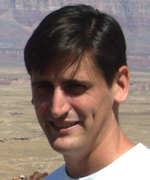 |
Chris Benner is a Ph.D. student working with Christopher Glass and Shankar Subramaniam in the departments of Molecular and Cellular Medicine and Bioengineering at UCSD. His research goals are to elucidate transcriptional regulation mechanisms from the computational analysis and discovery of cis-regulatory elements in genomic scale data sets. In addition to the development of general motif discovery algorithms, Chris is applying his methods and approach to the study of inflammatory diseases as well as the general cis-regulatory architecture underlying the recruitment of basal transcriptional machinery.
[Abstract] |
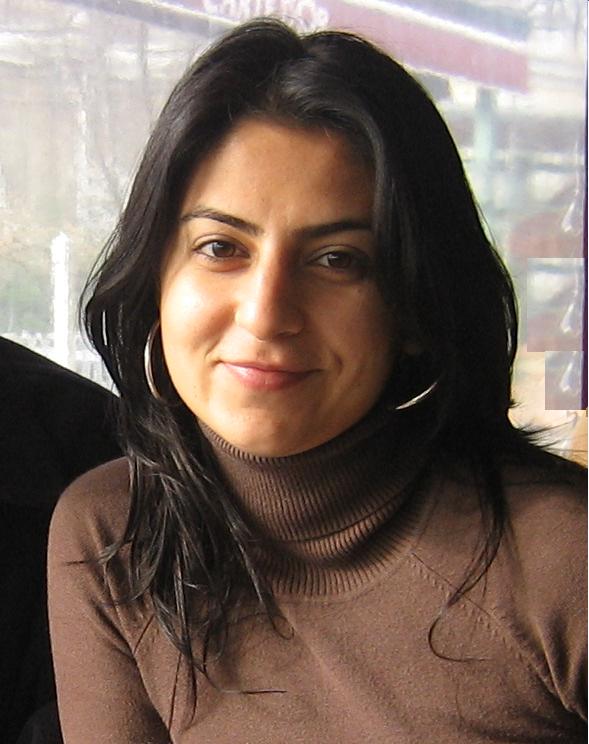 |
Banu Dost is a Ph.D. student working with Vineet Bafna in Computer
Science and Engineering department of UCSD. Her main research
interests are on algorithms, machine learning and their application to
computational biology. She is currently working on microarray
analysis, gene regulation and signal transduction pathways.
[Abstract] |
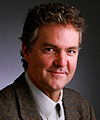 |
David Haussler is professor of biomolecular engineering at UC Santa Cruz, where he directs the Center for Biomolecular Science & Engineering. He is an Investigator with the Howard Hughes Medical Institute and serves as scientific co-director for the California Institute for Quantitative Biomedical Research (QB3). Dr. Haussler is a consulting professor at both Stanford Medical School and UC San Francisco Biopharmaceutical Sciences Department. He received his Ph.D. in computer science from the University of Colorado at Boulder. By focusing on scientific interactions between computer scientists and molecular biologists, Professor Haussler has played a leading role in developing the new field of computational biology. His work laid the foundation for the modern probabilistic approach to detecting and analyzing the biological components of the human genome. His collaborations led to algorithms to assemble the first public working draft of the human genome and posting it on the World Wide Web. In 2006 he was elected to National Academy of Sciences.
[Website] [Abstract] |
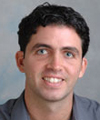 |
Manolis Kellis is an Assistant Professor of Computer Science at MIT, a member of the Computer Science and Artificial Intelligence Laboratory, and of the Broad Institute of MIT and Harvard. His research is in the area of computational biology, and in particular comparative genomics, genome interpretation, gene regulation, cellular networks, and genome evolution. He holds the Distinguished Alumnus (1964) Career Development Professorship, and is one of three young scientists recognized as the next generation in biotechnology by the Museum of Science. He obtained his Ph.D. from MIT, where he received the Sprowls award for the best doctorate thesis in computer science, and the first Paris Kanellakis graduate fellowship. Prior to computational biology, Manolis worked on artificial intelligence, sketch and image recognition, robotics, and computational geometry, at MIT and at the Xerox Palo Alto Research Center. Manolis lived in Greece and France before moving to the US. He was recently selected by Technology Review magazine as one of 35 top young innovators.
[Website] [Abstract] |
 |
Craig Mak is a graduate student in the Division of Biology at UCSD
working in Trey Ideker's lab. His work combines experimental and
computational approaches to elucidate gene regulatory networks. These
regulatory networks are typically derived by integrating genetic and
physical interaction networks with information about the molecular state
of the cell. Current work is focused on methods for constructing,
validating, and refining cellular networks, as well as cataloging them
in a new repository called CellCircuits.
[Website] [Abstract] |
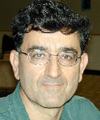 |
Ron Shamir is professor and head of the school of computer science and holds the Raymond and Beverly Sackler Chair in Bioinformatics at Tel Aviv University (TAU). He has a BSc in mathematics and physics from Hebrew University and a Ph.D. in operations research from UC Berkeley. Shamir founded the bioinformatics undergraduate degree program at TAU, and currently heads the Edmond J. Safra Bioinformatics Program at TAU. He specializes in design and analysis of algorithms, and since 1990 has focused on computational biology, specifically focusing his research on using computation to advance biology. Specific areas of study include gene expression analysis, comparative genomics, gene regulation, systems biology and medical genetics. He is on the editorial board of ten leading journals and series in theoretical computer science and computational biology, and on the steering committee of RECOMB. Dr. Shamir has published over 160 scientific publications.
[Website] [Abstract] |
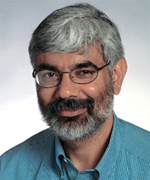 |
Shankar Subramaniam is a professor of Bioengineering in the Jacobs School of Engineering, and is also a Professor of Chemistry and Biochemistry, and Biology, at UCSD. He directs the university's Bioinformatics and Computational Biology graduate program, and is adjunct at the Salk Institute for Biological Studies. Subramaniam is a fellow of the American Institute for Medical and Biological Engineering and is a recipient of Smithsonian Foundation and Association of Laboratory Automatics Awards. Subramaniam received a Ph.D. in Chemistry in 1982 from the Indian Institute of Technology. He is also director of Data Coordination and Bioinformatics Core Laboratories for the Alliance for Cellular Signaling, a major five-year initiative that aims at deciphering the mechanisms of cellular response to stimuli.
[Website] |
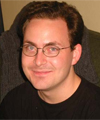 |
Stephen Tanner is a Bioinformatics graduate student at UCSD who splits his time between the labs of CSE's Vineet Bafna and Biology's Julian Schroeder. He investigates algorithmic topics in protein mass spectrometry and is currently working on ways to annotate plant genomes using peptide mass spectrometry. Tanner's past work has focused on the discovery and quantification of protein modifications. These modifications include post-translational modifications which regulate protein structure or signalling (such as phosphorylation). Other studies currently under way will characterize signalling pathways (and sequencing errors) in bacteria. Tanner developed a tool named Inspect, for efficient annotation of modified mass spectra.
[Abstract] |
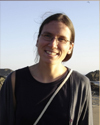 |
Christine Vogel is a post-doctoral fellow with Prof. Edward Marcotte at the University of Texas, Austin. Her current research explores both robustness in the face of gene knockouts and the dynamics of protein expression. Christine earned her Ph.D. in 2004 with Drs. Cyrus Chothia and Sarah Teichmann at the MRC Laboratory of Molecular Biology in Cambridge, UK, where she studied the evolution of the protein repertoire through domain duplication and recombination.
|

|
Michael Waterman holds an Endowed Associates Chair at the University of Southern California (USC), where he is a professor of computer science, mathematics and biological sciences. He arrived at USC in 1982 after positions at Los Alamos National Laboratory and Idaho State University. He earned his Ph.D. in Statistics and Probability from Michigan State University. Professor Waterman was named a Guggenheim Fellow the same year he was elected to the American Academy of Art and Sciences (1995), and was elected to the National Academy of Sciences in 2001. He is Professor-at-large at the Keck Graduate Institute of Life Sciences and in 2000 became the first Fellow of Celera Genomics. Professor Waterman works in the area of computational biology, concentrating on the creation and application of mathematics, statistics and computer science to molecular biology, particularly to DNA, RNA and protein sequence data. He is the co-developer of the Smith-Waterman algorithm for sequence comparison and of the Lander-Waterman formula for physical mapping.
[Website] [Abstract] |
|
|
